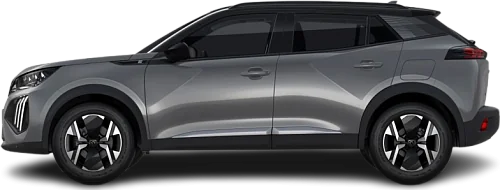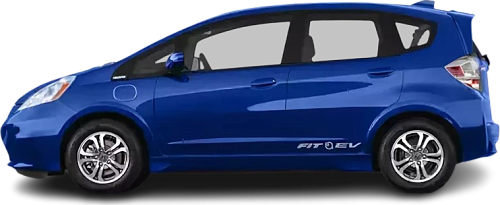USA EV Comparison: Peugeot e-2008 54 kWh vs Honda Fit EV Gen 1
Struggling to Decide? Let AI Help!
Your AI Summary Is Ready!
General Info
While the Peugeot e-2008 54 kWh (2023-…) is currently produced, it is not offered for sale in the United States. The Honda Fit EV (2013-2015) has been discontinued. You can find it for as low as $4100 on the used car market.
The Peugeot e-2008 54 kWh (2023-…) is a SUV, whereas the Honda Fit EV (2013-2015) is a Hatchback.
| Property | Peugeot e-2008 54 kWh | Honda Fit EV Gen 1 |
|---|---|---|
| Years of Production | 2023-… | 2013-2015 |
| Current Status | Produced | Discontinued |
| Country of Manufacture | China, Spain | USA |
| Body Style | SUV | Hatchback |
| Market Availability | EU | USA |
| Price USA (Used) | - Price USA (Used) | $4100 |
| GCC Score | 5.5 | 4 |
Range and Efficiency
The Peugeot e-2008 54 kWh (2023-…) boasts a greater real-world range, a larger battery, and superior energy efficiency compared to the Honda Fit EV (2013-2015).
| Property | Peugeot e-2008 54 kWh | Honda Fit EV Gen 1 |
|---|---|---|
| Range (EPA) | - Range (EPA) | 82 mi |
| Range (WLTP) | 252 mi | - Range (WLTP) |
| Range (GCC) | 214 mi | 78 mi |
| Battery Capacity (Nominal) | 54 kWh | 20 kWh |
| Battery Capacity (Usable) | 50.8 kWh | 19 kWh |
| Efficiency per 100 mi | 23.7 kWh/100 mi | 24.4 kWh/100 mi |
| Efficiency per kWh | 4.21 mi/kWh | 4.11 mi/kWh |
| Range and Efficiency Score | 7.2 | 5.4 |
Charging
Both vehicles utilize a standard 400-volt architecture.
The Honda Fit EV (2013-2015) has no DC fast charging capability, whereas the Peugeot e-2008 54 kWh (2023-…) can charge at up to 100 kW.
The Peugeot e-2008 54 kWh (2023-…) features a more powerful on-board charger, supporting a maximum AC charging power of 7.4 kW, whereas the Honda Fit EV (2013-2015) is limited to 6.6 kW.
| Property | Peugeot e-2008 54 kWh | Honda Fit EV Gen 1 |
|---|---|---|
| Max Charging Power (AC) | 7.4 kW | 6.6 kW |
| Max Charging Power (DC) | 100 kW | - Max Charging Power (DC) |
| Architecture | 400 V | 400 V |
| Charge Port | CCS Type 2 | Type 1 (J1772) |
| Charging Score | 4.4 | 2.7 |
Performance
Both vehicles are front-wheel drive.
Although the Peugeot e-2008 54 kWh (2023-…) has more power, the Honda Fit EV (2013-2015) achieves a faster 0-60 mph time.
| Property | Peugeot e-2008 54 kWh | Honda Fit EV Gen 1 |
|---|---|---|
| Drive Type | FWD | FWD |
| Motor Type | PMSM | PMSM |
| Motor Power (kW) | 115 kW | 92 kW |
| Motor Power (hp) | 154 hp | 123 hp |
| Motor Torque | 192 lb-ft | 189 lb-ft |
| 0-60 mph | 8.7 s | 8.1 s |
| Top Speed | 93 mph | 90 mph |
| Performance Score | 2.9 | 2.7 |
Dimensions
The Peugeot e-2008 54 kWh (2023-…) boasts a more extended wheelbase.
| Property | Peugeot e-2008 54 kWh | Honda Fit EV Gen 1 |
|---|---|---|
| Length | 169.4 in | 161.6 in |
| Width (with Mirrors) | 78.2 in | 66.7 in |
| Width (w/o Mirrors) | 69.9 in | - Width (w/o Mirrors) |
| Height | 60 in | 60 in |
| Wheelbase | 100.9 in | 98.4 in |
Cargo and Towing
Neither car is equipped with a frunk (front trunk).
Neither vehicle is officially rated for towing in the US.
| Property | Peugeot e-2008 54 kWh | Honda Fit EV Gen 1 |
|---|---|---|
| Number of Seats | 5 | 5 |
| Curb Weight | 3578 lb | 3252 lb |
| Cargo Volume (Trunk) | 15.3 ft3 | 12 ft3 |
| Cargo Volume (Max) | 51.8 ft3 | - Cargo Volume (Max) |
| Cargo Volume (Frunk) | - Cargo Volume (Frunk) | - Cargo Volume (Frunk) |
| Towing Capacity | - Towing Capacity | - Towing Capacity |
| Cargo and Towing Score | 5.3 | 4 |




